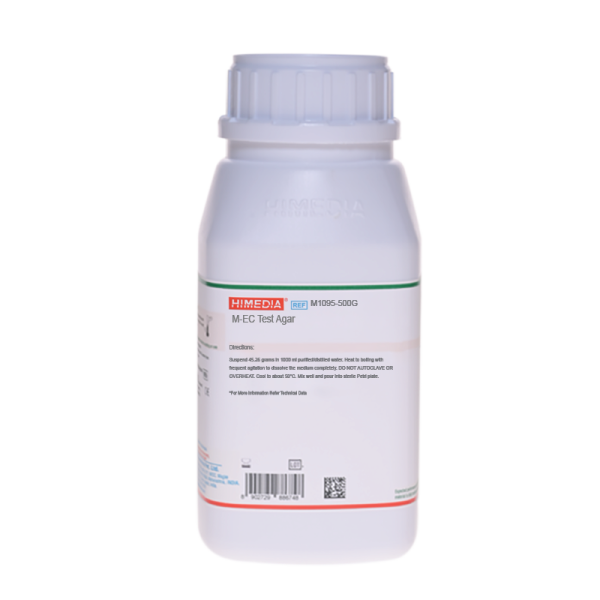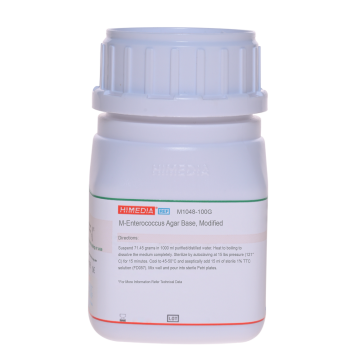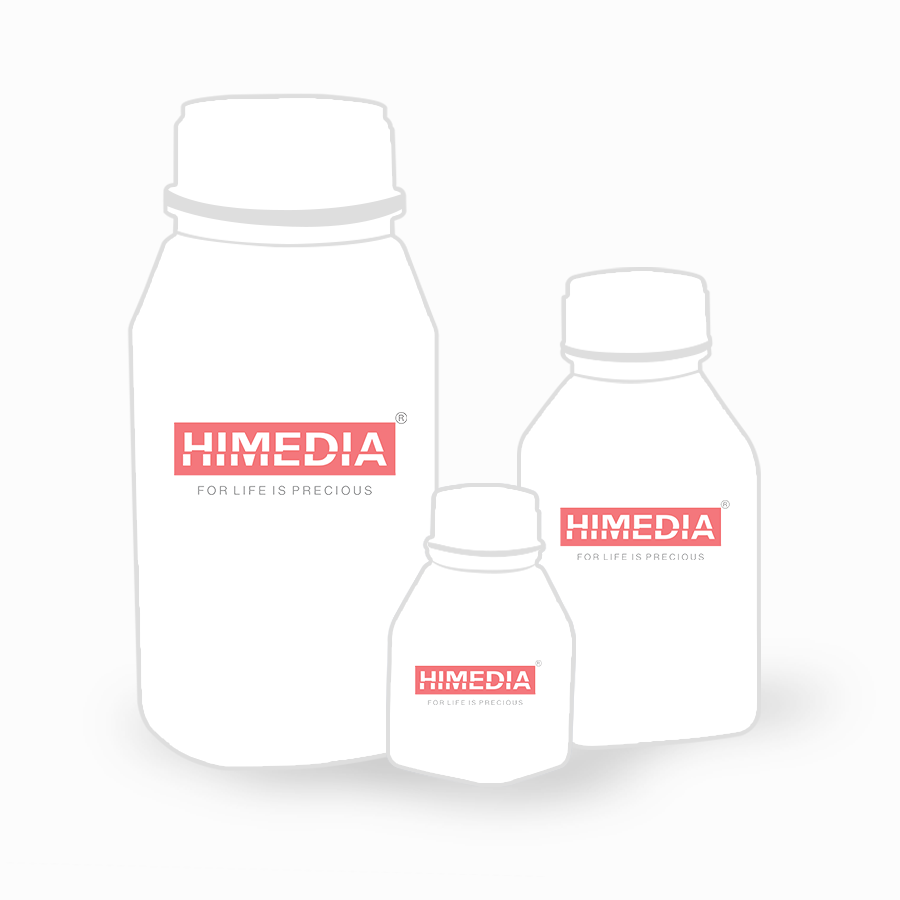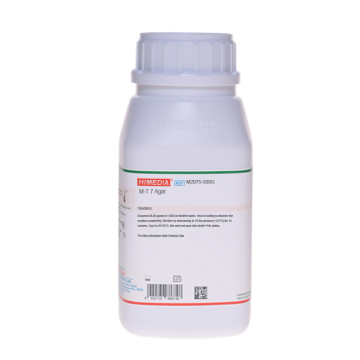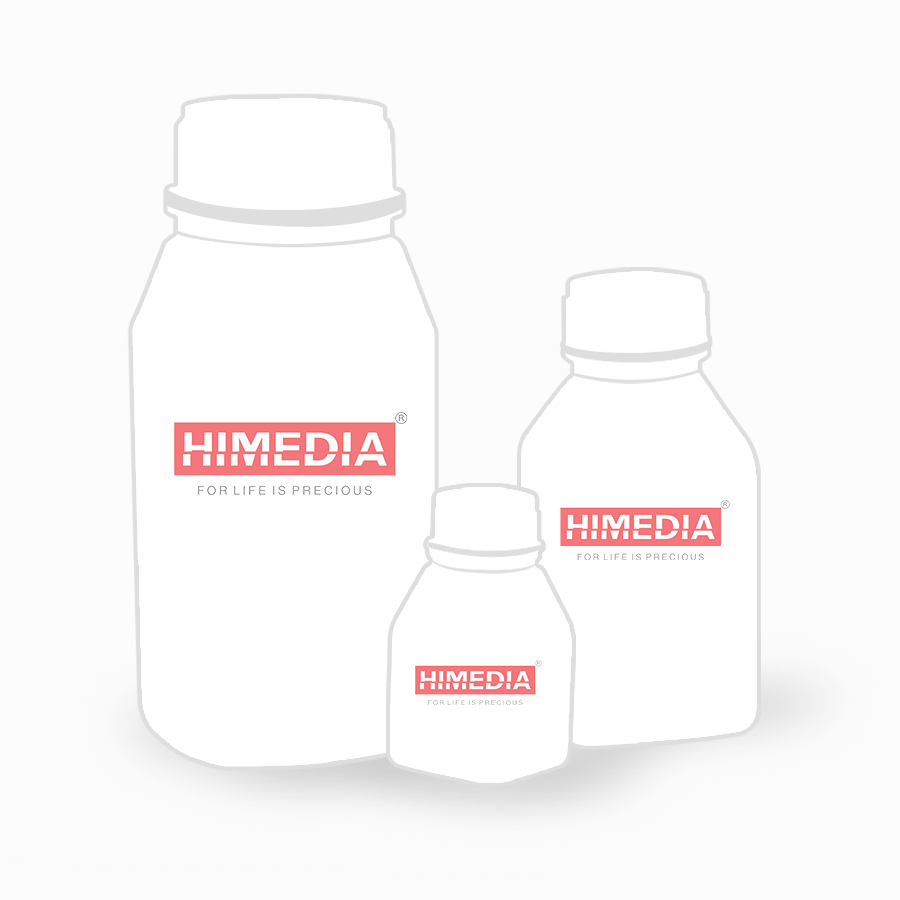 Your enquiry has been submitted
Your enquiry has been submitted
M-EC Test Agar
Intended Use
Recommended for testing Escherichia coli in water samples using membrane filtration technique.
Composition
| Ingredients | Gms / Litre |
|---|---|
| Proteose peptone | 5.000 |
| Yeast extract | 3.000 |
| Lactose | 10.000 |
| Sodium chloride | 7.500 |
| Dipotassium hydrogen phosphate | 3.300 |
| Potassium dihydrogen phosphate | 1.000 |
| Sodium lauryl sulphate (SLS) | 0.200 |
| Sodium deoxycholate | 0.100 |
| Bromocresol purple | 0.080 |
| Bromphenol red | 0.080 |
| Agar | 15.000 |
Final pH (at 25°C): 7.3±0.2
**Formula adjusted, standardized to suit performance parameters
Directions
Suspend 45.26 grams in 1000 ml purified/distilled water. Heat to boiling with frequent agitation to dissolve the medium completely. DO NOT AUTOCLAVE OR OVERHEAT. Cool to 45-50°C. Mix well and pour into sterile Petri plates.
Principle And Interpretation
Examination of water, foods, ingredients and raw materials, for the presence of indicator groups such as coliforms is one of the most common tests in a microbiology laboratory, partly because of the relative ease and speed with which these tests can be accomplished. Where it is claimed that drinking water has been processed for safety, the finding of such organism demonstrates a failure of the process. It is a valuable bacterial indicator for determining the extent of faecal contamination of recreational surface waters or drinking water (2). M-EC Test Agar is recommended for the detection, differentiation and enumeration of Escherichia coli and coliforms in water using membrane filter technique (1). Proteose peptone and yeast extract provide necessary nutrients for the growth of coliforms. Lactose is the carbon source as well as fermentable carbohydrate in the medium. Sodium deoxycholate and sodium lauryl sulphate inhibit the growth of contaminating gram-positive microorganisms. Bromocresol purple and bromphenol red are the pH indicators.
Type of specimen
Water samples
Specimen Collection and Handling
Filter the sample through a membrane filter. Place the membrane on M-EC Test Agar and incubate at 35 ± 0.5°C for 2 hours to rejuvenate injured or stressed bacteria and then incubate at 44.5 ± 0.2°C for 22 hours. Transfer filter to a filter pad saturated with urea substrate (Urea 2.0 g + phenol red 10 mg + distilled water 100 ml, adjust the pH between 3 and 4 use within one week). After 15 minutes, count yellow or yellow brown colonies using a fluorescent lamp and magnifying lens. E. coli produces yellow or yellow brown colonies.
After use, contaminated materials must be sterilized by autoclaving before discarding.
Warning and Precautions
Read the label before opening the container. Wear protective gloves/protective clothing/eye protection/face protection. Follow good microbiological lab practices while handling specimens and culture. Standard precautions as per established guidelines should be followed while handling specimens. Safety guidelines may be referred in individual safety data sheets
Limitations
- Due to varying nutritional requirements, some strains may be encountered that grow poorly.
- Individual organisms differ in their growth requirement and may show variable growth patterns on the medium.
- Each lot of the medium has been tested for the organisms specified on the COA. It is recommended to users to validate the medium for any specific microorganism other than mentioned in the COA based on the user's unique requirement.
Performance and Evaluation
Performance of the medium is expected when used as per the direction on the label within the expiry period when stored at recommended temperature.
Quality Control
Appearance: Light yellow to green homogeneous free flowing powder
Gelling: Firm, comparable with 1.5% Agar gel
Colour and Clarity of prepared medium: Purple coloured clear to slightly opalescent gel forms in Petri plates
Reaction: Reaction of 4.5 w/v aqueous solution at 25°C. pH: 7.3±0.2
pH: 7.10-7.50
Cultural Response
Cultural characteristics observed after an incubation at 35-37°C for 18-24 hours.
| Organism | Inoculum (CFU) | Growth | Colour of Colony |
|---|---|---|---|
| Escherichia coli ATCC 25922 (00013*) | 50-100 | luxuriant | yellow |
| Staphylococcus aureus subsp. aureus ATCC 25923 (00034*) | >=104 | inhibited | |
| Enterococcus faecalis ATCC 29212 (00087*) | >=104 | inhibited |
Key: (*) Corresponding WDCM numbers.
Storage and Shelf Life
Store between 10-30°C in a tightly closed container and the prepared medium at 20-30°C. Use before expiry date on the label. On opening, product should be properly stored dry, after tightly capping the bottle in order to prevent lump formation due to the hygroscopic nature of the product. Improper storage of the product may lead to lump formation. Store in dry ventilated area protected from extremes of temperature and sources of ignition. Seal the container tightly after use. Product performance is best if used within stated expiry period.
Disposal
User must ensure safe disposal by autoclaving and/or incineration of used or unusable preparations of this product. Follow established laboratory procedures in disposing of infectious materials and material that comes into contact with sample must be decontaminated and disposed of in accordance with current laboratory techniques (3,4).
Reference
- Baird R.B., Eaton A.D., and Rice E.W., (Eds.), 2015, Standard Methods for the Examination of Water and Wastewater, 23rd ed., APHA, Washington, D.C.
- Corry J. E. L., Curtis G. D. W., and Baird R. M., Culture Media for Food Microbiology, Vol. 34, Progress in Industrial Microbiology, 1995, Elsevier, Amsterdam
- Isenberg, H.D. Clinical Microbiology Procedures Handbook 2nd Edition.
- Jorgensen, J.H., Pfaller, M.A., Carroll, K.C., Funke, G., Landry, M.L., Richter, S.S and Warnock., D.W. (2015) Manual of Clinical Microbiology, 11th Edition. Vol. 1.
| Product Name | M-EC Test Agar |
|---|---|
| SKU | M1095 |
| Product Type | Regular |
| Physical Form | Powder |
| Origin | Animal |
| Packaging type | HDPE |
| References | 1. Corry J. E. L., Curtis G. D. W., and Baird R. M., Culture Media for Food Microbiology, Vol. 34, Progress in IndustrialMicrobiology,1995, Elsevier, Amsterdam |
| Customized Product Available | No |



